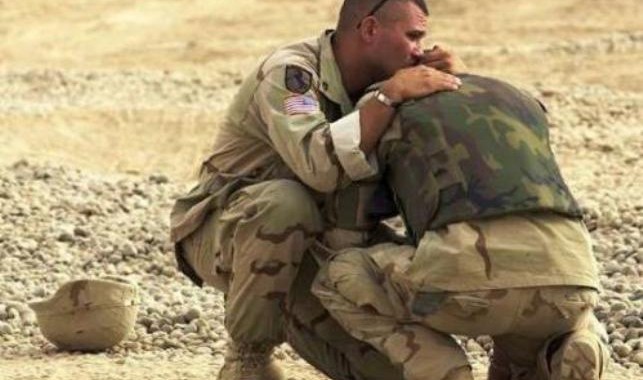Coming Home is a life-sucking, difficult thing for many military members who return from combat. Moving from facing daily death to mowing the lawn simply doesn’t happen for some. The battle continues, sometimes more severe after they leave the combat zones.
MSG Tim Shelton – the Ghosts of Battle
I met Msg Tim Shelton, US Army, online while he was stationed at Bagram Airbase in Afghanistan back in May of 2014. A member of Uncle Sam’s, he was excited that he only had a few short months to go before he could leave and go home. His notes to me here are used by permission of his wife Amy. I hope that the progression of his life from deployment to civilian status will show all of you what our military members go through, and why many do not come out on the other side.
- US Servicemen waiting to leave Bagram AFB in Afghanistan Sept 8, 2014
He was sitting in the pax terminal ready to leave on September 8, 2014. He seemed excited and told me he’d talk to me and maybe write something for us when he got stateside.
September 8, 2014 – “I may have some writing for you to maybe consider when I get back, lots of things screwed up over here, unbelievable.”
September 10, 2014 – “Faye, made it to Bangor, ME, so glad to be away from that place.”
[What Tim did not realize at the moment was “that place” had followed him home.]
September 10, 2014, continued – “I am going through what is apparently a significant case, dreams, flashbacks, no sleep, etc…was surprised when my counselor recognized your name. Thanks for all you do, everything helps…”
[I checked on him on occasion up until October 25 when he wrote,]
October 25, 2014 -“Hey, Faye, not too well, have a hard time sleeping so I tend not to, food is an afterthought, anxiety is way up there about 3 days of the week but I’m still seeing my counselor, she has me on a sleep med and a pill to suppress the nightmares, but I still fight it… I’m working through it as best I can…”
[Cpt Valerie Scott, his counselor, tried everything normally used to help him.]
January 29, 2015- “Hey, Faye just checking in, hope you are well. Anxiety is off the chart, can’t stay in the house, in my camper on the river. Very peaceful it helps. Still working, haven’t retired yet, it’s all that keeps me going, I think. I don’t know what to do or where to go. I’m seeing my counselor but not too sure..I’m seeing my psych and it helps. The dreams are terrible and they’re every night. This sux.”
February 16, 2015 – “Hey Faye, new development the Army has decided to MEB me, apparently I’m too nuts to stay active duty, LOL, but I’m still working and briefing my O-6 and the 101 ABN Div CDR monthly.”
[Suddenly, his purpose was lost at the most crucial time].
May 31, 2015 – “Hey, Faye hanging in there, I’m going through the med board, it’s kinda hard seeing your name listed as not recommended for further service. But I’ve made all my va appointments and am waiting my rating. This sux, I live in my camper because it only has one door to check when I’m paranoid (all the time). The dreams are still there but I’m on drugs that are supposed to stop them. Thnx for the kind thought, it means more than you know.”
My last communication with Tim was June 1, 2015. Two short months later, he was gone. His funeral was held on August 6, 2015. I will never forget him, nor his precious family who still grieve his loss.
Treatment – drugs
For our combat veterans, there is a chemical inside the brain that changes with heightened tension. In battle, that chemical change keeps them alive. In civilian life it tries to kill them. The stress chemical adrenaline increases during combat. When they come home, it lodges in the “emotional” part of the brain and stays there. [Cortisol, the stress hormone is a factor as well].
Research is being done to see how it can be removed, but it doesn’t help those going through the issue now, or the ones who went through it previously.
Current treatment usually involves dulling the dreams and anxiety with drugs. In the case of a US Marine, William Wold, that method eventually led to disaster.
“It’s hard to kill, and it’s hard not to get killed…” the sentiments of Marine William Wold as he was being interviewed by Kevin Sites while he was in Fallujah, Iraq. But his biggest battles were yet to be faced when he arrived home.
After he was home for a while, Wold began to display problems, particularly on the 4th of July. The sounds of firecrackers and the smoke made him twitch and pace…as he screamed at his mother that there was “no switch that can turn off what’s going on in here.” As his pulse raced out of control, his mother had to scream back at him in order to calm him down- and that took 3 tries.
Change the paradigm
For Wold, too, the battle had come home with him. Ghosts, very real ones plagued him. The litany of drugs prescribed plus the addition of methadone took his life in the end.
Do our legislators really understand the problem? Does the military? Does Society? The concept of “damaged” service members leaves many in fear, rather than giving a hand up to them. The VA lists veterans as “mentally deficient” and simply causes their guns to be taken away.
The answer may begin with a change in the perception – the changing of the paradigm of our returning veterans. A grocery list of drugs is not the answer, but true finding of ways to help them cope would be.









